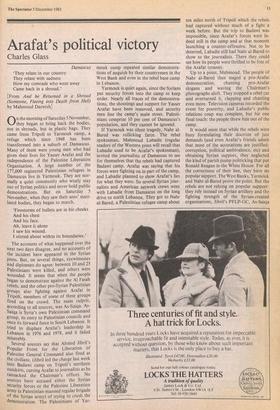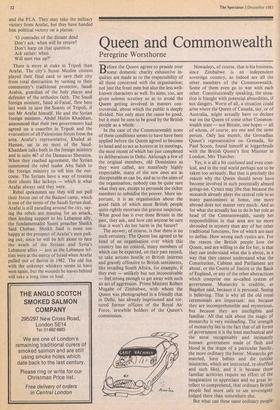Arafat's political victory
Charles Glass
Damascus 'They relate in our country They relate with sadness How my comrade who went away Came back in a shroud.'
[From And he Returned in a Shroud (Someone, Fleeing into Death from Hell) by Mahmoud Darwish] On the morning of Saturday 5 November, they began to bring back the bodies, not in shrouds, but in plastic bags. They came from Tripoli to Yarmouk camp, a refuge which since 1948 has been transformed into a suburb of Damascus. Many of them were young men who had given their lives for Yasser Arafat and the independence of the Palestine Liberation' Organisation. A large number of the 177,000 registered Palestinian refugees in Damascus live in Yarmouk. They are nor- tnally a quiet community who wisely stay out of Syrian politics and never hold public demonstrations. But on Saturday 5 November, when they saw their sons' muti- lated bodies, they began to march.
'Firestorms of bullets are in his cheeks And his chest And his face.
Ah, leave it alone 1 saw his wound.
I stirred about within its boundaries.'
The accounts of what happened over the next two days disagree, and no accounts of the incident have appeared in the Syrian press. But, on several things, eyewitnesses and diplomats do agree: between 10 and 25 Palestinians were killed, and others were wounded. It seems that when the people began to demonstrate against the Al Fatah rebels, and the other pro-Syrian Palestinian groups also fighting against Arafat in Tripoli, members of some of these groups fired on the crowd. The main culprit, according to all sources, was As-Saiqa. As- Saiqa is Syria's own Palestinian command group, its entry to Palestinian councils and once its forward force in South Lebanon. It tried to displace Arafat's leadership in Lebanon in 1976 and 1978, and it failed miserably.
Several sources say that Ahmed Jibril's Popular Front for the Liberation of Palestine General Command also fired at the civilians. (Jibril led the charge last week into Badawi camp on Tripoli's northern outskirts, cursing Arafat to journalists as he ransacked the Chairman's office). No sources have accused either the Syrian security forces or the Palestine Liberation army (a Palestinian-manned regular brigade of the Syrian army) of trying to crush the demonstration. The Palestinians of Yar-
mouk camp repeated similar demonstra- tions of anguish by their countrymen in the West Bank and even in the rebel base camp in Lebanon.
Yarmouk is quiet again, since the Syrians put security forces into the camp to keep order. Nearly all traces of the demonstra- tions, the shootings and support for Yasser Arafat have been removed, and security men line the camp's main street. Palesti- nians comprise 10 per cent of Damascus's population, and they cannot be ignored.
If Yarmouk was silent tragedy, Nahr al- Bared was rollicking farce. The rebel spokesman, Mahmoud Labadie (regular readers of the Western press will recall that Labadie used to be Arafat's spokesman), invited the journalists of Damascus to see for themselves that the rebels had captured Badawi camp, Arafat was saying that his forces were fighting on in part of the camp, and Labadie planned to show Arafat's lies for what they were. So several Syrian jour- nalists and American network crews went with Labadie from Damascus on the long drive to north Lebanon. They got to Nahr al-Bared, a Palestinian refugee camp about ten miles north of Tripoli which the rebels had captured without much of a fight a week before. But the trip to Badawi was impossible, since Arafat's forces were in- deed still in the camp and at that moment launching a counter-offensive. Not to be deterred, Labadie still had Nahr al-Bared to show to the journalists. There they could see how its people were thrilled to be free of the Arafat tyranny.
Up to a point, Mahmoud. The people of Nahr al-Bared then staged a pro-Arafat demonstration, chanting pro-Arafat slogans and waving the Chairman's photographs aloft. They stopped a rebel car and overturned it, clapping and chanting even more. Television cameras recorded the event for posterity, and Labadie's public relations coup was complete, but for one final touch: the people threw him out of the camp.
It would seem that while the rebels were busy formulating their doctrine of just demands (and even Arafat's friends admit that most of the accusations are justified: corruption, political ambivalence, etc) and obtaining Syrian support, they neglected the kind of parish pump politicking that put Ronald Reagan in the White House. For all the correctness of their line, they have no popular support. The West Banks, Yarmouk and Nahr al-Bared prove the point. But the rebels are not relying on popular support: they rely instead on Syrian artillery and the fighting strength of the Syrian-created organisations, Jibril's PFLP-GC, As-Saiqa and the PLA, They may take the military victory from Arafat, but they have handed him political victory on a platter.
`0 comrades of the distant dead Don't ask: when will he return? Don't harp on that question. Ask rather: when Will men rise up?'
There is more at stake in Tripoli than Arafat. The city's Sunni Muslim citizens played their final card to save their city from total destruction by turning to their community's traditional protector, Saudi Arabia, guardian of the holy places and defender of the orthodox faith. The Saudi foreign minister, Saud al-Faisal, flew here last week to save the Sunnis of Tripoli, if not Mr Arafat himself. He and the Syrian foreign minister, Abdel Halim Khaddam, announced that their two governments had agreed on a ceasefire in Tripoli and the evacuation of all Palestinian forces from the area. Arafat's representative, Khaled al- Hassan, sat in on most of the Saud- Khaddam talks both in the foreign ministry and in suite 467 of the Damascus Sheraton. When they reached agreement, the Syrian summoned the rebel leader Abu Saleh to the foreign ministry to tell him the out- come. The Syrians have a way of treating their clients like lackeys — which is what Arafat always said they were.
Rebel spokesmen say they will not pull their forces out of the Badawi camp, which is one of the terms of the Saudi-Syrian deal. Arafat is still parading around the city, say- ing the rebels are massing for an attack, then lending support to his Lebanese ally, the fundamentalist Sunni preacher Sheikh Said Chaban. Sheikh Said is none too happy at the prospect of Arafat's men pull- ing out, since he will be left alone to face the wrath of the Syrians and Syria's Lebanese allies — just as the Lebanese lef- tists were at the mercy of Israel when Arafat pulled out of Beirut in 1982. The old fox with the unkempt whiskers seems to have won again, but the wounds he leaves behind' will take a long time to heal.















































 Previous page
Previous page